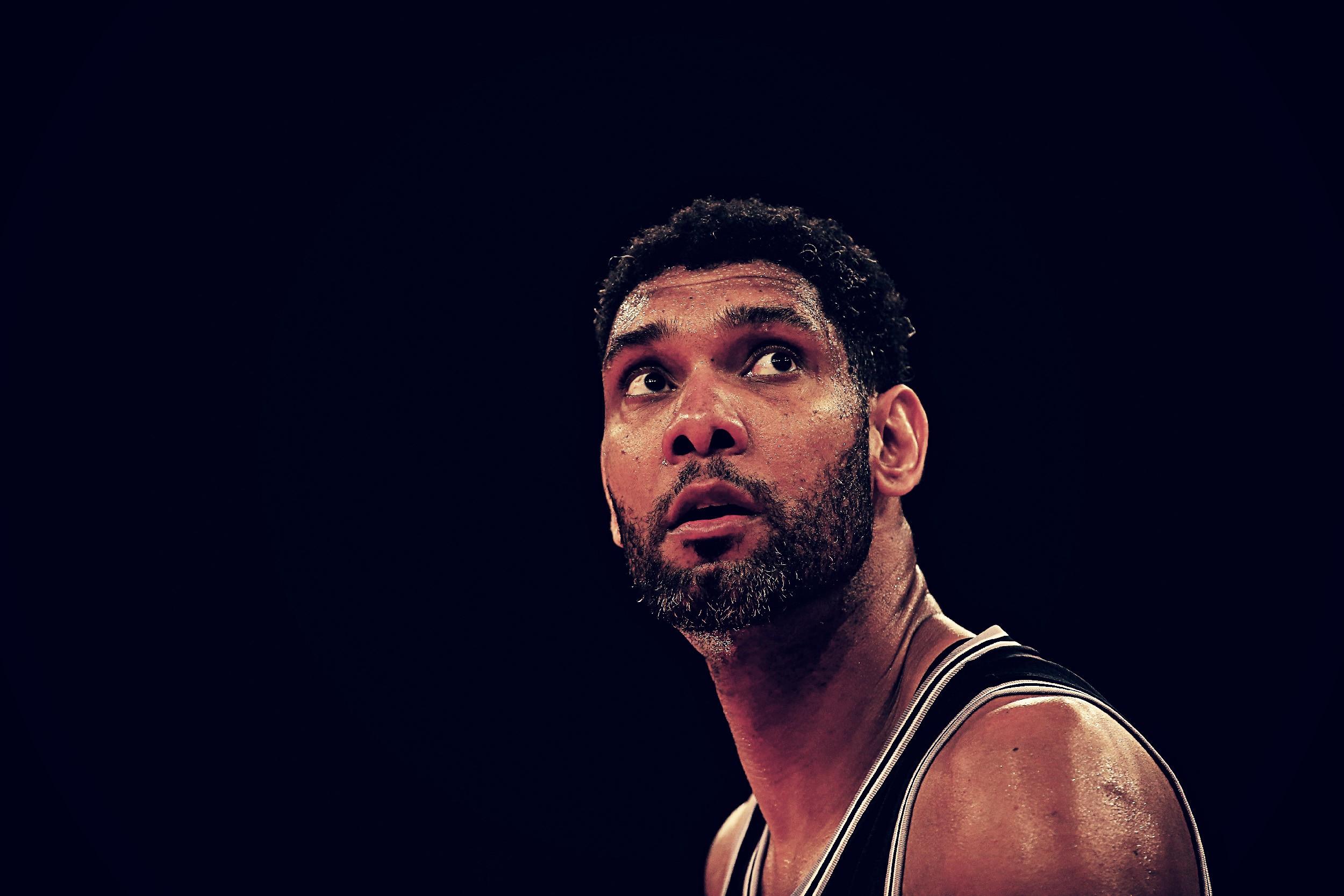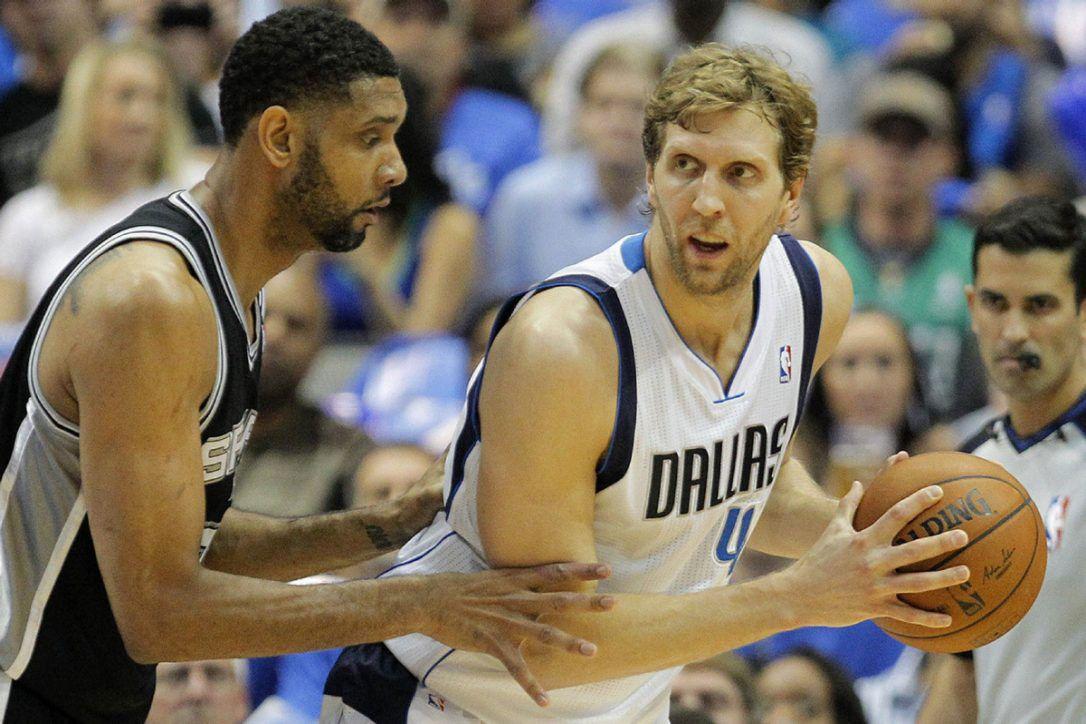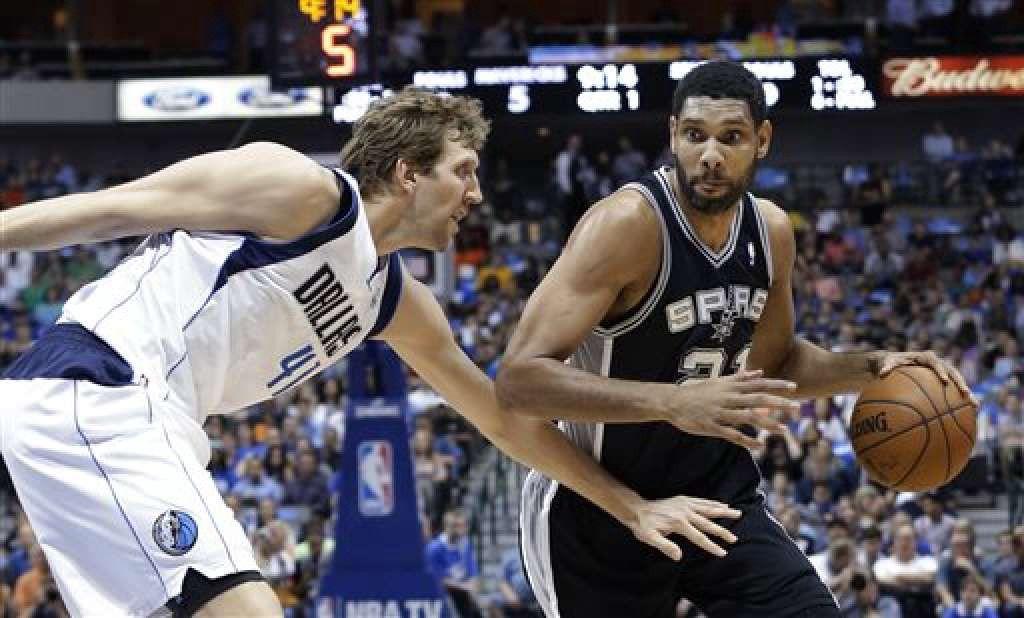
Over the course of nearly two decades in the NBA, Tim Duncan faced many challenges. Sometimes he lost, usually he won, and the fight was always interesting. Duncan announced his retirement on Monday, and to commemorate the occasion we look back on some of his greatest duels.
Duncan vs. the Highlight Factory
When looking back at Tim Duncan’s 19 seasons in the NBA, it’s nearly impossible to see the trees for the forest. Unlike Kobe, he isn’t a man of moments. The tapestry of Duncan’s career is dense and tightly woven. His accomplishments are as unimpeachable as his personage is blank, which has made him a modern tableau for concepts like success and greatness in their most distilled form. If the theatrical pursuit of something other than just winning means nothing to you, Duncan is your NBA patron saint.
When moments do stand out — for instance, his game-tying, heads-up 3-pointer with three seconds remaining in overtime of Game 1 of the San Antonio Spurs’ 2008 first-round playoff series against the Phoenix Suns — they do so as exceptions, not as an exemplars of style. He had an anti-style that crossed generations. He was knowingly unhip in every facet of his life, and it showed in his fashion sense and how hard it was to make a compelling highlight reel from his performances.
Which is why, when I think of specific moments in Duncan’s career, I end up thinking of the times when he was victimized by others. I swear it’s not out of disrespect. It’s actually the opposite. Duncan is the backdrop that gives these plays that extra bit of meaning; he’s the San Fernando Valley in a Paul Thomas Anderson movie. Making a violently beautiful play on Duncan is its own kind of iconoclasm. It’s a fleeting assertion of free will over an institution beyond your grasp, like tossing your classwork into a bonfire after the last day of school, knowing full well you’ll have to face the drudgery again in a few months.
Here are my three favorites, in chronological order:
Vince Carter, November 1, 2002
Had Carter not considerately done a rim-hanging pirouette over Duncan’s shoulders back in 2002, we would have witnessed a Frederic Weis incident on one of the greatest players ever.
Amar’e Stoudemire, May 30, 2005
LeBron James’s block on Andre Iguodala in this year’s Finals objectively was a better postseason defensive play, but Stoudemire’s series-saving block on Duncan in Game 4 of the 2005 Western Conference finals will forever be my sentimental favorite.
LeBron James, November 3, 2006
James’s antigravitational sledgehammer on Duncan in 2006 borrowed elements from Tom Chambers’s “Stairway to Heaven” dunk and Shawn Kemp’s Lister Blister, and turned it down to about a 7. Still, an incredible in-game poster. LeBron and the Cavs would later be swept by the Spurs in the Finals. — Danny Chau
Duncan vs. the Press Conference
“Uhhhhh,” Tim Duncan began. It was 2014, and he had just won his fifth NBA title. He had one more foe to conquer: the podium press conference.
He’d been asked about winning the title on Father’s Day. “Very special,” Duncan said. “It was already a special day. But to do it at home, to do it with my kids and my family and my friends here, made it so much more special. Just a great experience and a great experience for them.”
Group press conferences rarely yield Ali-like gems. But Duncan brought a special disdain to the proceedings. He wasn’t even smiling when he answered that softball. He looked like he’d just lost the title on Father’s Day.
Another softball: Was this title his sweetest? “It is,” he said. “For whatever reason, it is sweeter than any of the other[s]. Whether it be because of the time frame, because I’m coming toward the end of my career, because I can have these two here and really remember and enjoy the experience. All those things make it that much more special.” He still wasn’t smiling.
Duncan will be remembered as being great at everything but delivering pithy quotes. When it came to press conferences, he had tremendous downside: modesty. A boring demeanor. A resistance to ginning up bulletin-board material for the other team. These are the traits that writers say they want out of great players. Any writer who’s honest wants exactly the opposite: immodesty, flamboyance, provocation.
Duncan had a final unfortunate quirk: He didn’t worry about courting the writers. At those Finals, columnist Mike Wise ventured a question: Was there any special lesson an over-the-hill basketball player could share?
“Honestly?” Duncan said. “Don’t listen to the media.” — Bryan Curtis
Duncan vs. Advertising
It’s a testament to Duncan’s importance as a player that brands insisted on making him a pitchman despite the mountain of evidence that he had no interest in being one. He was just too important to ignore; he had to be in commercials, whether he wanted to or not.
Early on in his career, Duncan kept his personality in the background. Maybe he had one, maybe he didn’t: You’d never know from his abbreviated performance in this 1998 Sprite commercial featuring Kobe Bryant and Missy Elliott.
In spots like this 2003 one for Edge shaving gel with David Robinson, Duncan’s squareness was the hook.
Just a couple of Spurs, tripping over their own dorkiness, frolicking in a garden and shit. 2003 was Square Spurs — oblivious to trends and styles outside of the basketball academy they’d built. As years went by, and as Duncan took over for Robinson as the undisputed face of the franchise, he came into his own.
Brand Duncan became self-aware. He was always in on the joke, but somehow that didn’t make the joke any funnier — though the fact that the joke wasn’t funny made it all a little bit funny.
Late in his career, “Tim Duncan” became a thing. Anecdotally, I am going to pin this to the rise of comedies like Curb Your Enthusiasm, The Office, and Arrested Development. I’ll save the meat of this for my master’s thesis, but here’s the short version: As consumers became more and more accustomed to laughing at awkward characters and situations, brands started marketing to that new appetite. Duncan was a great test case. Rather than hide it, commercials were built around his flat affect.
The truth is, Duncan was always funnier and more personable than he got credit for. He just hid it from a national television audience. He preferred his on-camera work to mirror his on-court work: collaborating with his teammates to make a good product that San Antonio could be proud of.
Tim Duncan: basketball icon. Reluctant salesman. Local hero. — Chris Ryan
Duncan vs. Dirk
My mother first found out that I cursed when I was in the eighth grade. It happened one night when I left my notebook on the kitchen table to go play video games in my room. I was playing for about an hour before I heard my mother’s voice scream my entire name (first, middle, and last). I ran downstairs and there she was, holding my notebook open. She turned it around so I could see it and asked, “What does this say, Mister?”
It said, “Fuck Tim Duncan.”
If you grew up in Dallas, you probably had similar feelings toward Duncan. His greatness was never questioned, but he made being a Mavericks fan beyond frustrating, for two reasons:
1. He was always better.
2. He was beloved. And classy AF.
Let’s start with the first point: By all accounts, what Dallas has done as an organization since 2000 is incredible. But when it comes to basketball in Texas, there’s “incredible” and then there are the Spurs.
The Mavs played over-.500 basketball for 12 consecutive seasons. Cool. The Spurs have been doing it for 19 seasons (and counting). The Mavs went to the playoffs 15 out of the past 16 seasons. Again, the Spurs just wrapped their 19th straight trip to the playoffs. Dallas has a ring. THE SPURS HAVE FIVE. And finally, the Mavs have a once-in-a-generation star who has changed the game.
The Spurs have Tim Duncan.
As painful as it is for me to admit, Tim was always better than Dirk. That’s a fact. The margin of superiority can be debated. What’s not up for discussion is how much freaking fun it was to watch these two battle. Tim and Dirk played 33 playoff games against each other. Duncan has a 4–2 series lead over Dirk, but their game record is a narrower 18–15. But head-to-head, Tim had Dirk’s number, Duncan averaging 24 and 12 (plus two blocks) in those games to Nowitzki’s 23 and 10.
Here is the easiest way to explain Timmy’s superiority over Dirk.
Exhibit A:

How does this picture make you feel? Do you have goose bumps? I do. An offensive savant one-on-one against a defensive master. This is our Batman vs. Superman. No matter who wins, this possession can be decided only by beautiful basketball. Seriously, chills everywhere.
Exhibit B:

How does this picture make you fee — OH MY GOD. SOMEONE PLEASE HELP DIRK. HE’S IN TROUBLE. THIS ISN’T SAFE.
All you can hear is a plea for help defense. Dirk was great on offense, but so was Duncan. It’s what Duncan did on defense that made him so much better than Dirk.
Do you know what it’s like to have a perfect mortal enemy? It sucks. The Spurs are literally without sin. Spurs fans talk shit to me and I don’t have a single counter except for maybe Manu’s bald spot. The Spurs are the single classiest organization of the four major sports.
And of course Duncan has led the charge. His selfless nature and respect for other players makes it impossible to hate him (which always made me hate him). Duncan is so nice that his in-state rival, Dirk, always said he would have enjoyed playing with Tim. Apologies to the kids on my lawn, but you shouldn’t say that about a guy against whom you’ve played 33 playoff games. That’s Duncan, though. He beat the hell out of you every time. Then he helped you up as everyone cheered along. Tim Duncan was the worst … because he was the best. — Jason Gallagher
Duncan vs. Fashion
“Tim Duncan’s whole swag,” my former colleague The Kid Mero once quipped, “is the barrel that you put all your old-ass clothes in and send to D.R.”
Which is to say, Duncan’s closet overfloweth with ill-fitting flannels, NT Denim, and the most mundane of footwear — Marshalls racks on racks on racks. All of this makes for easy joke fodder, sure, but Timmy’s hype-least steez is also admirable: He embodied the IDGAF ethos of normcore long before it became an affectation.
In my research of off-court Duncan pictures throughout his career — spanning the wildly disparate eras of Iverson’s throwbacks, Stern-mandated suits, and today’s trash couture — I could discern absolutely no difference in his wardrobe choices over 15-plus years. Seriously, how did you dress in 2001? TD is not like you. He is mercilessly, confoundingly, impeccably consistent. I’m now reminded of another relevant quote: “If you’re never in style,” the saying goes, “you’re never out of style.” — Donnie Kwak
Duncan vs. Positionality
It’s easy to talk about how we historically overlook Duncan and his impact on the league, yet we’ve given him the biggest courtesy a player can be bestowed. We’ve deemed him the greatest power forward ever.
He is. But the last time he spent a majority of his playing time at that position was 10 years ago. Basketball-Reference has his estimated career positional split at an even 70 percent center and 30 percent power forward. In deference to centers like Bill Russell and Wilt Chamberlain and Kareem Abdul-Jabbar, this is the way in which we’ve decided to honor Duncan’s legacy while keeping our glass displays intact. But Duncan is making his exit at a point when positional nomenclature has never been more indistinct. Will this kind of shifting down ever happen again? Will it ever matter as much as it did in the past?
Duncan is the closest thing we have to a modern NBA time capsule. He survived the Jurassic era of Shaquille O’Neal and Yao Ming; he survived in a frontcourt landscape that produced players in the vein of Kevin Garnett, Rasheed Wallace, and Dirk Nowitzki; he survived (and dominated) the league’s mid-aughts up-tempo renaissance; and he’s lasted long enough to see a player like Draymond Green, all 6-foot-7 of him, nominally play the position Duncan has quietly lorded over for nearly two decades.
With his reputation as a traditionalist, Duncan will never be seen as a revolutionary. But we played with semantics for Duncan’s sake, out of respect for his incredible career. It’s was an admission that there are shades of gray cloaked in the most definitive thing you could say about a player. Positionality is fluid. It always has been. We’ll go into the future testing the limits of that theory. Duncan won’t be the first player to come to mind when we think of how the game has evolved, but he was there to help break the seal. He’s been there for everything. — Chau

